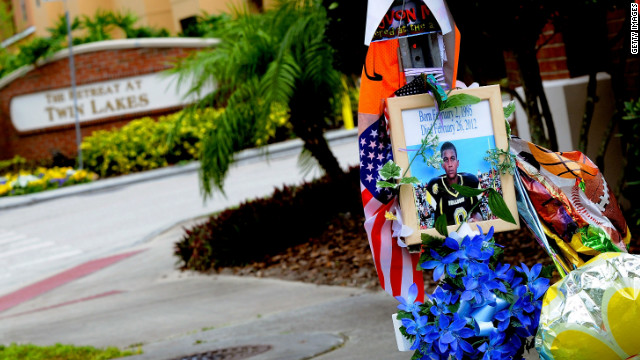updated 7:06 PM EDT, Thu March 22, 2012

A memorial to Trayvon Martin outside The Retreat at Twin Lakes community where he was shot by George Michael Zimmerman.
Editor's note: LZ
Granderson, who writes a weekly column for CNN.com, was named journalist
of the year by the National Lesbian and Gay Journalists Association and
a 2011 Online Journalism Award finalist for commentary. He is a senior
writer and columnist for ESPN the Magazine and ESPN.com. Follow him on
Twitter: @locs_n_laughs Watch him on Tuesdays on CNN Newsroom in the 9 am ET hour.
(CNN) -- I don't trust cops and I don't know many black people who do.
I respect them. I sympathize with them. I am appreciative of the work they do.
But when you've been
pulled over for no good reason as many times as I have; when you've been
in handcuffs for no good reason as many times as I have; when you run
out to buy some allergy medication and upon returning home, find
yourself surrounded by four squad cars with flashing lights and all you
can think about is how not to get shot, you learn not to trust cops.

LZ Granderson
The first instance of
injustice surrounding the Trayvon Martin tragedy occurred February 26,
the night George Zimmerman decided to pursue, confront and ultimately
shoot and kill Martin. The second started the moment the Sanford police
failed to properly investigate what, given the 911 tapes, is clearly a
questionable claim of self-defense made by Zimmerman. But seeing that
Martin's parents were forced to sue the police department just to hear
the tapes, it seems as if Zimmerman isn't the only questionable
component in this case.
Thursday, Sanford Police
Chief Bill Lee stepped down "temporarily." On Wednesday, Sanford city
commissioners had voted "no confidence" in him.
But at a town hall meeting
hosted by the NAACP on Tuesday, Sanford's black residents said they
lost confidence in the police long before because of the extensive
history of prejudicial treatment in the area.
Law enforcement isn't
easy. In fact, it is extremely dangerous. But that in no way excuses
improper procedure and lies. And given the amount of effort put forth by
the Sanford chief to exonerate Zimmerman, a volunteer neighborhood
watchman with a history of 911 calls that suggests paranoia, versus
efforts to find out the truth, it sure feels like another case of racial
profiling and police trying to cover up an impropriety.
The shooter may
not have been a police officer, but the story of how the police handled
this case is oh-so-familiar.
It's the same story the nation heard from blacks in Los Angeles surrounding the 1991 Rodney King beating.
It's the same story heard
from blacks in New York City surrounding the murder of Amadou Diallo,
who was only carrying his wallet when he was shot 41 times by four
plainclothes policemen in 1999.
That same story was
heard in New Orleans, where black men were shot and killed for sport by
police officers off the Danziger Bridge in 2005. The police department
covered it up for two years before any arrests were made. Charges were
even initially dismissed by the district judge before the Justice
Department got involved and finally, last summer, officers were
convicted.
And people wonder where
the impetus behind NWA's "___ the Police" came from. I'll tell you where
it came from. It came from knowing there are far more stories like
Trayvon Martin's that the world never hears about. In fact, we almost
didn't hear about this one. The nation heard the 911 tapes from last
month's tragic shooting at Chardon High School in Ohio within 24 hours of the incident. Martin's parents had to file a lawsuit before they could hear the ones in this case.
Why?
If the police department
had done everything it was supposed to do, if it was truly "PROHIBITED
from making an arrest based on the facts and circumstances they had at
the time" as the letter released by the city manager states, then why
hold back until there is national media attention?
The letter said the
department was still investigating the case and didn't want to
compromise it, but the authorities never brought Zimmerman in for
questioning. They still haven't. They tested Martin's body for drugs and
alcohol, but not Zimmerman's. The only person with a weapon was
Zimmerman. Martin was unarmed.
Just like the victims in New Orleans, Diallo, King. ...
In 2010, the family of
Sean Bell was awarded $7 million by the city of New York after five
police officers sprayed his car with more than 50 bullets, killing him.
He was unarmed and to be married the next day.
"No amount of money can
provide closure, no amount of money can make up for the pain," his
fiancee, Nicole Paultre Bell, said after the ruling. "We'll just try to
learn how to live with it and move on."
Those are words members
of the black community have to say to each other far too many times when
it comes to treatment by the police.
No comments:
Post a Comment